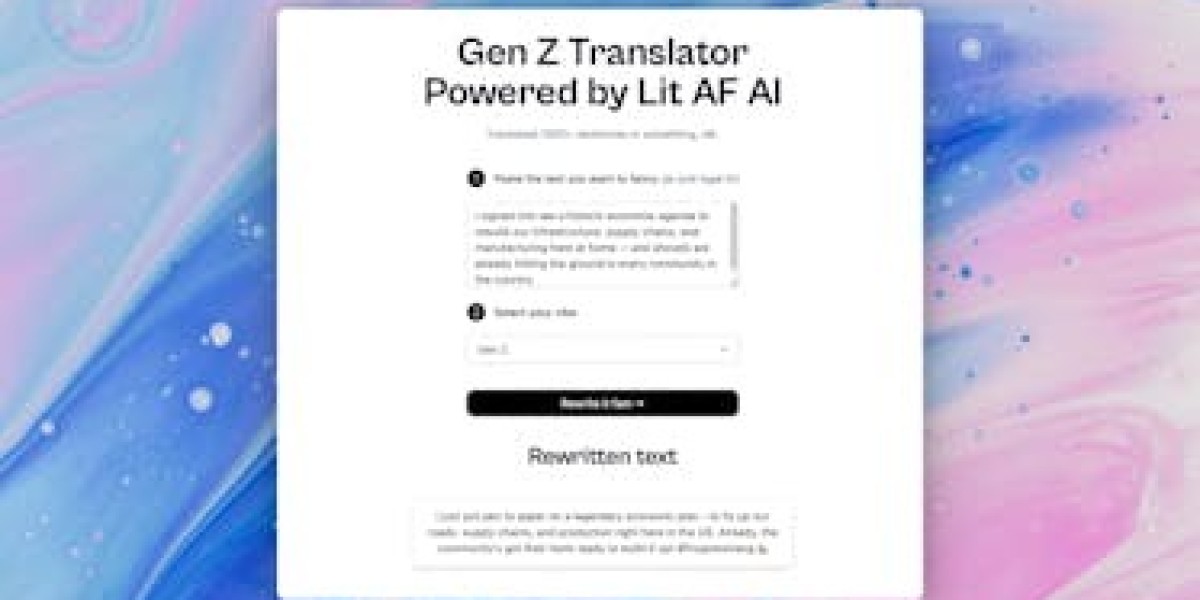The digital divide isn't just about access to technology anymore—it's also about understanding how different generations use it. As Gen Alpha enters the online space with a language that often leaves older generations scratching their heads, AI-powered tools like a gen alpha slang translator are proving to be more than just fun gimmicks. These tools are helping bridge communication gaps between generations, fostering better understanding, collaboration, and even innovation across age groups.
Understanding Gen Alpha and the Language Shift
Gen Alpha, typically defined as those born from 2010 onwards, is the first generation to grow up entirely in the digital age. Unlike Millennials or even Gen Z, they’ve had access to smartphones, voice assistants, and YouTube Kids from infancy. This exposure has led to the evolution of a unique linguistic style—rooted in memes, emojis, abbreviations, and evolving internet culture.
For older generations—Boomers, Gen X, and even some Millennials—this new digital dialect can feel like a foreign language. Misunderstandings aren't just common; they’re expected. What may seem like a harmless phrase to one generation could carry an entirely different meaning to another. That’s where AI tools like a gen alpha slang translator come in, helping decode the often playful yet perplexing language of the youngest online users.
What Is a Gen Alpha Slang Translator?
A gen alpha slang translator is typically an AI-based tool or app designed to interpret and explain slang, emojis, abbreviations, and digital expressions used by Gen Alpha. Powered by natural language processing (NLP) and machine learning algorithms, these translators pull from real-time social data, chat patterns, and trending online conversations to keep up with rapidly evolving slang.
Much like how Google Translate converts languages, a Gen Alpha slang translator interprets the nuanced, often hyper-contextualized language of the younger digital generation into standard English. This allows parents, educators, employers, and marketers to better engage, understand, and connect with Gen Alpha.
Why Bridging Generational Gaps Matters
In workplaces, schools, and even families, communication is everything. Generational misunderstandings can lead to breakdowns in collaboration, alienation, and missed opportunities. When a Gen Alpha teenager uses terms like “rizz,” “slay,” or “NPC energy,” older adults may misunderstand the intent or emotion behind the words. Worse, attempts to engage using outdated language can make these adults seem disconnected or tone-deaf.
By employing AI tools like slang translators, organizations and individuals can bridge this gap:
Parents can understand what their kids are talking about online and open lines of honest communication.
Teachers can relate better to their students, making learning more relevant and engaging.
Marketers can craft campaigns that resonate authentically with younger audiences.
HR professionals can foster inclusive workplaces where all voices are heard and understood.
AI as a Cultural Interpreter
AI isn't just translating language—it’s translating culture. Slang is often a byproduct of cultural shifts, identity exploration, and creative expression. The evolution of terms often reflects what's happening in society—everything from social movements to meme trends.
A gen alpha slang translator helps more than just with word-for-word translation. It can also provide context: where the slang originated, what platform it's popular on (like TikTok or Roblox), and how it's typically used. This added layer of insight allows older generations to grasp not only what Gen Alpha is saying, but why they’re saying it.
Benefits Beyond Language
Using AI to understand Gen Alpha’s slang opens the door to deeper intergenerational engagement. Some benefits include:
Better Digital Literacy: Adults who actively try to understand new forms of expression often improve their overall digital fluency.
Stronger Family Bonds: Parents who “get it” are more likely to build trust and maintain open conversations with their children.
Smarter Marketing: Brands that understand Gen Alpha's values and language can create content that doesn't feel forced or cringeworthy.
Inclusive Education: Teachers can tailor their communication styles to create more accessible and relatable learning environments.
Workforce Readiness: As Gen Alpha enters the workplace in the coming years, companies that understand their mindset will have a competitive edge.
Risks and Ethical Considerations
While AI slang translators offer incredible value, they also come with a few caveats. Language, especially among younger users, changes fast—and can often include context-specific, edgy, or inappropriate content. AI tools must be designed with ethical parameters to avoid misinterpretation or inappropriate normalization of harmful phrases.
Also, there’s a fine line between understanding Gen Alpha and co-opting their culture. Adults using their slang without context may come across as disingenuous or even mock them inadvertently. The goal should be understanding, not imitation.
How to Use a Gen Alpha Slang Translator Effectively
To get the most out of these AI tools, consider the following tips:
Stay Curious: Don’t just use the tool for laughs. Use it to genuinely understand the context behind the words.
Keep It Updated: Language evolves rapidly—especially online. Ensure you're using a version that's regularly updated with fresh data.
Engage in Dialogue: Use translations as conversation starters with your kids, students, or team members.
Respect the Culture: Slang often carries emotional or cultural weight. Approach with empathy, not ridicule.
The Future of Intergenerational Communication
The Gen Alpha slang translator is just the beginning. In the future, we may see AI evolve into even more advanced cultural bridges—capable of interpreting tone, emotional subtext, and even generational attitudes. Virtual mentors powered by AI could one day offer personalized communication coaching based on generational context.
But for now, the humble slang translator is already proving to be a surprisingly powerful tool. It helps us remember that language is always evolving—and that connection across generations requires more than just speaking; it requires understanding.








